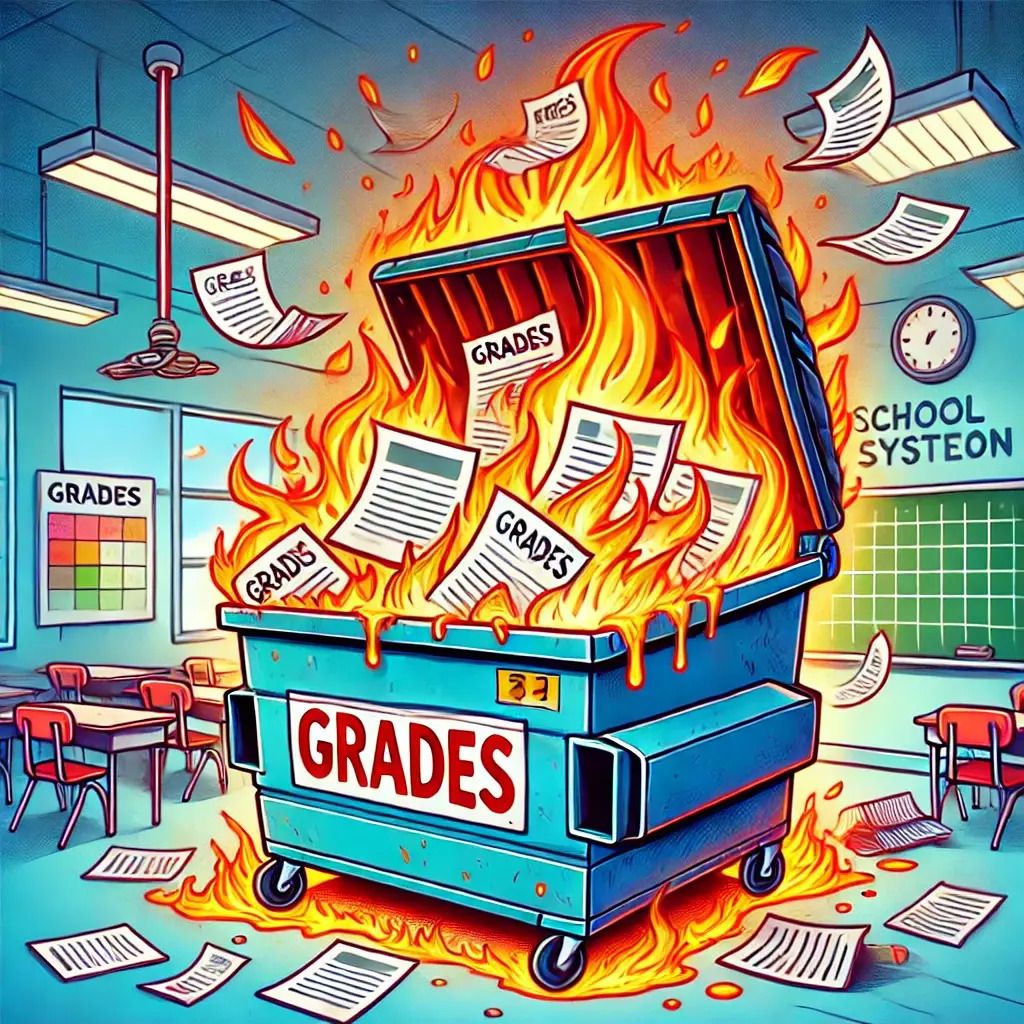- The Progress Report
- Posts
- The Grading Game Hasn't Changed
The Grading Game Hasn't Changed
Grades have been inconsistent for a century—and nothing has changed.

Hi.
Welcome to The EDU Files, bringing education insights, stories, and vibes to your inbox every Tuesday.
Welcome back, educational rock stars! I hope you had a Thanksgiving full of gratitude, family, and maybe one too many slices of pie 🥧 (no judgment). As we head into the final stretch before winter break ❄️, it’s a good time to refocus on what matters most - our students, their growth, and the systems we use to measure and support their learning.
This week, we are expanding on some of my earlier conversations about the wild world of grading 📝, grade inflation 📈, and the evolving perceptions of what grades actually mean. It’s heavy stuff, but as school leaders, these are exactly the challenges we’re called to tackle.
Let’s dig in.
Deep Dive 🤿
Grades Don’t Work Like They Used To - Here’s How to Fix Them
Let’s be honest: grades have always been a little mysterious.
A century ago, researchers found that teachers gave the identical English paper scores ranging from 50 to 98. Fast forward a hundred years, and I would argue that not much has changed. Teachers are still mixing effort, behavior, participation, and (maybe, just maybe) academic achievement into one grade, creating what researchers lovingly call the “hodgepodge effect.” You’d think we’d have figured this out by now, but here we are - still grading the way our great-grandparents did.
When the pandemic hit, this dilemma was exacerbated - with grading going from “messy but manageable” to “full-on dumpster fire.” Schools were forced to rethink grades as learning environments turned virtual, students disappeared into patchy Wi-Fi zones, and participation became a matter of survival rather than effort. The cracks in our grading systems didn’t just show - they gaped open, demanding attention.

But did we fix them? Not really. Instead, we kept on grading like nothing happened, and the results are catching up with us.
The Context: Grading in Crisis
Grading practices are like an old family recipe - passed down through generations but never quite written down correctly. Sure, it works in a pinch, but nobody really knows what’s in it. My dissertation explored how grading inconsistencies - combined with teacher characteristics like grade level taught and training - create unreliable and often meaningless grades. Teachers admitted they’d factor in effort, behavior, and even neatness (yes, neatness) when assigning grades. The result? A system where what a grade means depends more on who’s teaching than what’s taught.
And it’s not just teachers. Administrators, parents, and even policymakers contribute to the confusion. When state testing standards were lowered post-pandemic, it sent a message: “We’re not sure what grades mean either.” Combine that with grade inflation, which was already an issue pre-pandemic, and the whole thing starts to look like a house of cards - about to fall.
How School Leaders Can Take Action: Ask your teachers: “What does a grade mean in your classroom?” Use their answers to identify inconsistencies and start a dialogue about aligning grading practices across your school.
Grade Inflation: The Balloon That Keeps Rising
Here’s the thing about grade inflation: it’s not new, but it’s definitely gotten worse. A recent study from the ACT found that grade inflation is persistent and systemic, with students’ GPAs going up while standardized test scores remained flat. It’s like giving someone a gold star for showing up, even if they didn’t understand a word that was taught.
The problem isn’t just the inflation itself - it’s what it represents. Grade inflation undermines trust in the system. Colleges, employers, and even parents start to wonder, “Does an ‘A’ really mean what it used to?” For students, it creates a false sense of security that can come crashing down when they hit the rigors of college or the workforce. For teachers, it adds a layer of pressure as they juggle parent expectations, administrative directives, and their own professional judgment.
How School Leaders Can Take Action: Analyze GPA trends over the past five years in your school. Are grades rising while other indicators of learning (like test scores or project outcomes) remain flat? If so, start a conversation with your team about recalibrating grading standards.
Parent Perceptions: Grades as a Shrinking Barometer
Parents used to see grades as the gold standard for their child’s progress. An “A” meant mastery; a “C” meant room for improvement. But according to recent surveys, that perception is shifting. For many parents, grades have lost ground as a reliable measure of what their kids actually know and can do.
This is a dangerous trend. When parents stop trusting grades, they turn to other measures - standardized tests, extracurricular activities, or gut feelings. This creates a feedback loop of distrust that only widens the gap between home and school. For school leaders, this shift should be a wake-up call. If we don’t address the root problems with grading, we risk losing one of the most critical partnerships in education: the one between schools and families.
How School Leaders Can Take Action: Host a parent forum with the question: “What do grades mean to you?” Use their input to shape a communication plan that clearly explains how grades are determined and why they matter.
Reform: The Hard Work of Leadership
So, what do we do? First, let’s stop pretending that grading is just a “teacher problem.” Grading reform is a leadership challenge, and it requires systemic change. School leaders need to create clear policies that align grading practices with learning outcomes. That means ditching the hodgepodge approach and moving toward systems that prioritize fairness, consistency, and validity.
Second, we must invest in professional learning that empowers teachers to grade purposefully. Teachers need training in assessment design, feedback strategies, and bias mitigation - not just a memo saying, “Hey, we’re doing standards-based grading now.”
Finally, let’s involve parents in the conversation. Grading reform will only work if families understand why it matters and how it benefits their kids. Transparent communication can rebuild trust and create a shared understanding of what grades should represent: not just effort or behavior, but real, meaningful learning.
How School Leaders Can Take Action: Start a grading support team in your school. Include teachers, parents, and students to co-create grading policies that align with your school’s mission and vision.
A Call to Action
Grading reform isn’t just an educational issue; it’s a social justice issue. When grades fail to reflect learning, they fail our students. As leaders, we have a moral obligation to fix the system - not next year or the year after, but now. The pandemic gave us a chance to rethink the way we do school. Let’s not waste it by clinging to outdated practices that don’t serve our kids.
Remember, leadership isn’t about maintaining the status quo. It’s about challenging it. It’s about having the courage to ask hard questions and the humility to admit when we don’t have all the answers. It’s about putting students first, even when it’s uncomfortable. Grading reform won’t be easy, but then again, nothing worth doing ever is.
Track of the Week 🎶
Turn on, tune in, and check out…
Because, let’s face it, coming back from a long break and diving straight into the deep end of grading reform takes Rocky-level determination 🥊. Plug this into your playlist, and let it fuel your week as you tackle the challenges ahead.
Click the iPod to check out the track I have on repeat this week. Check out The EDU Files playlist for tunes to keep you rockin’ throughout the week.
Surfing the Web 🌊
Here is my favorite EDU content from the web this week.
Grade Inflation: Why It Matters and How to Stop It by Adam Tyner
Harvard’s Too Easy. I Looked Into Literally Every Possible Way to Fix It by James Tobin
Think Again: Does “Equitable” Grading Benefit Students? by Adam Tyner
Be sure to check these out…
Feedback 💭
What’d you think of this email?
Please take 10 seconds to drop your thoughts on this week’s content. I value your feedback. Thanks a bunch.
Before You Go…
Do you enjoy this content? Share it with an educator friend or have them sign up for The EDU Files here.
Thanks for spreading the word, and keep up the good fight. The work you do matters.
See ya next Tuesday! 🍏
PS: If you are interested in supporting your school or district with any of the content or strategies in The EDU Files, click here to drop me a note or to talk more.
